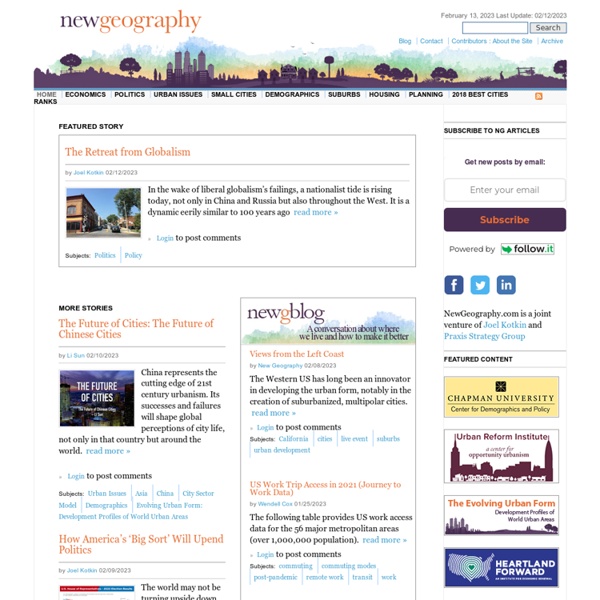



Capital Markets China Urban Development Blog | A First-Hand Account of China's Modernization Urbanomics The Big Picture Ireland after NAMA Study uncovers 'de-urbanization' of America Public release date: 23-Sep-2009 [ Print | E-mail Share ] [ Close Window ] Contact: Brendan M. Lynchblynch@ku.edu 785-864-8855University of Kansas LAWRENCE — More than any other populace on Earth, Americans are on the move. Now, one researcher at the University of Kansas has made a vital study of how a population in perpetual motion impacts local tax bases and economies around the nation. Art Hall, executive director of the Center for Applied Economics at the KU School of Business, said he uncovered three key themes to American population shifts by looking at annual data collected by the Internal Revenue Service on county-to-county migration: He found that Populations are relocating to coastal areas (with the major exception that inhabitants for the first time are taking flight from California's prohibitively priced seaboard) People are moving out from major metropolises to smaller cities The general migration trend in the U.S. now is eastward rather than westward [ Print | E-mail
RCLCO The Transport Politic Sustainable Urban Mobility in 2020 To make the car of the future, we need to make the city of the future, says MIT designer Ryan Chin. How can you design a city by designing a car? Today’s automobiles are driven by an increasing number of users who live in cities. The United Nations reported in 2007 that migration patterns and population growth have created an equal split between inhabitants of cities and rural areas for the first time in human history. In 1950, New York City was the only megacity on the planet, with 10 million occupants. The world’s automobile fleet is currently estimated at 800 million cars that serve the 7.8 billion people living on Planet Earth. Size and Weight 2010: Today’s automobiles weigh an average of nearly 4,000 lb, approximately 20 times the weight of the driver. 2020: Tomorrow’s automobiles will be more lightweight and smaller. Range and Speed 2020: Tomorrow’s automobiles will not need that much refueling autonomy. Gasoline versus Electric Driver-Controlled versus Autonomous Driving 1. 2. 3.
Resorts Agriculture urbaine Laboratoire | Un laboratoire de recherche, d'innovation et d'intervention en agriculture urbaine